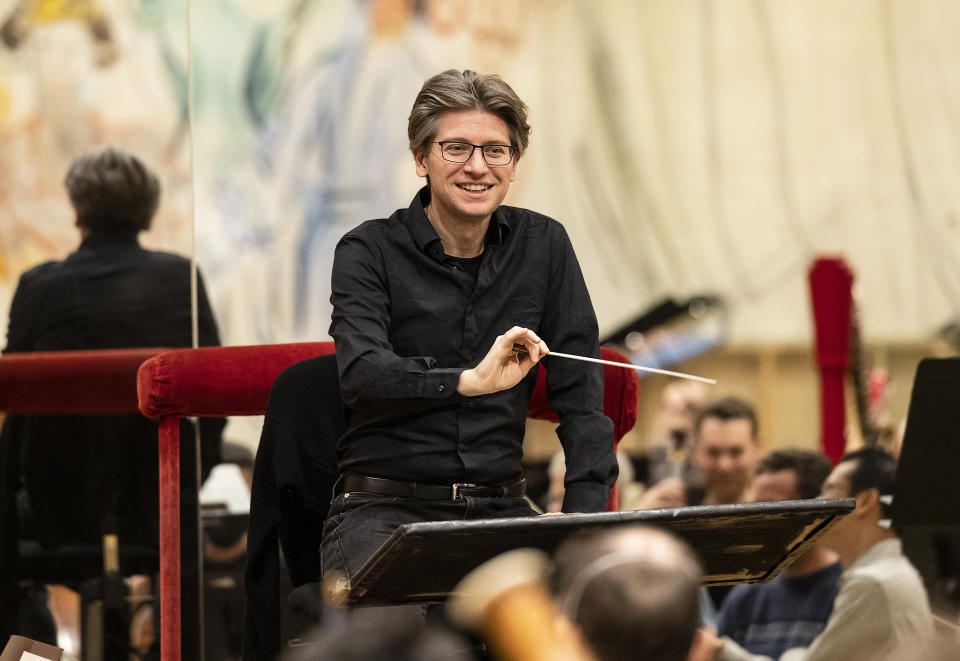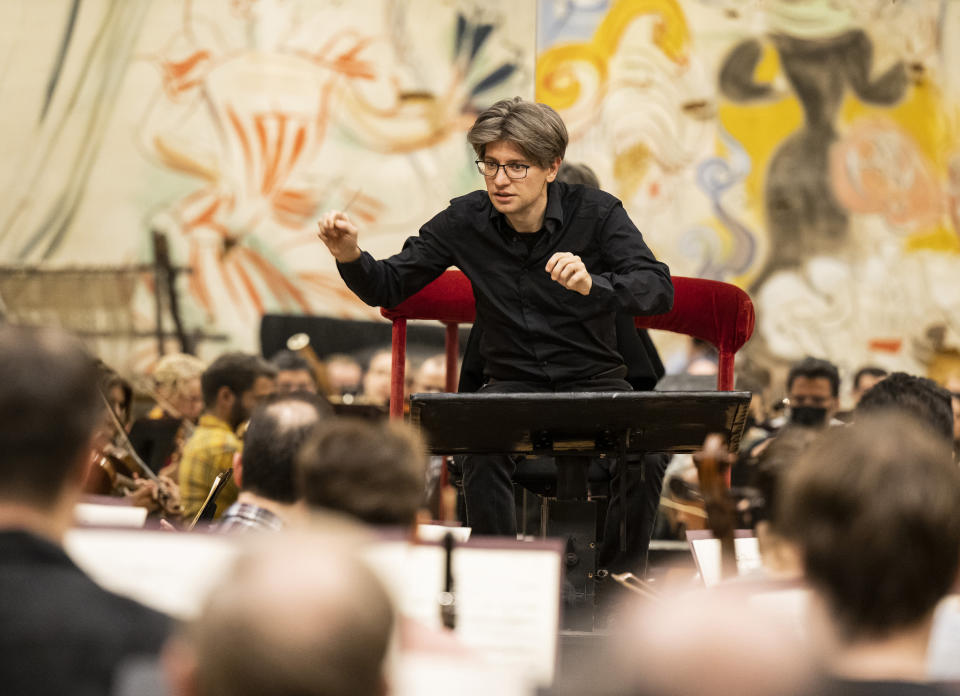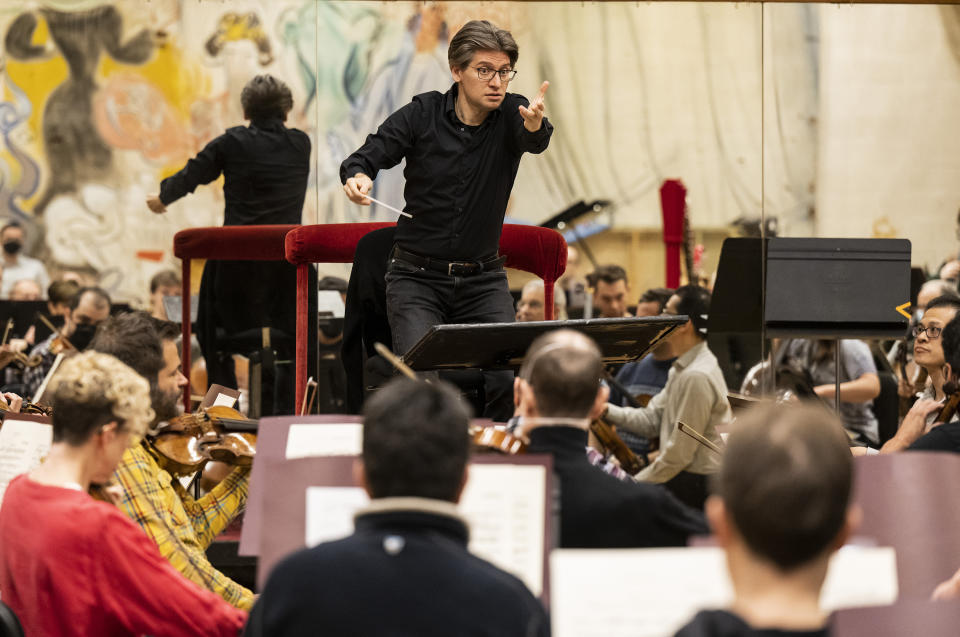Meeting Muti at age 10, Rustioni knew he wanted to conduct
NEW YORK (AP) — Daniele Rustioni was a 10-year-old in the La Scala children’s chorus when he saw Riccardo Muti for the first time.
“I want to be him,” Rustioni recalled thinking. “I was very — how can say? — loud as a kid. He said: `You should be a conductor because you are very extroverted.‘”
With his 40th birthday approaching on April 18, Rustioni is music director of the Lyon Opera in France and the Ulster Orchestra in Northern Ireland. He serves as principal guest conductor of Munich’s Bavarian State Opera and will be on the podium for the Metropolitan Opera’s revival of Verdi’s “Falstaff” starting Sunday.
“Rustioni belongs to the old style of conductors that take music and operas very, very seriously,” the 81-year-old Muti said from his home in Ravenna, Italy. “He’s a very good conductor and a serious musician — I underline the word serious because I see that today many conductors don’t concentrate, especially in operas, and they are not prepared. They don’t know anything about the vocal technique, about composition, and just they move the arms.”
Rustioni's mother was a chorus singer and encouraged him to join the children’s choir at Milan’s Teatro alla Scala during the tenure of Muti, music director from 1986-2005. After appearing in Leoncavallo’s “Pagliacci,” Prokofiev’s “Ivan the Terrible,” Orff’s “Carmina Burana” and Puccini’s “La Boheme,” Rustioni got the solo role of Third Boy in Mozart’s “Die Zauberflöte (The Magic Flute)” late in a 2005 run led by Muti.
“It can be the easiest job in the world but also the hardest,” Rustioni remembered Muti explaining the podium work. “You have to study 10 years of piano, 10 years of composition, 10 years of conducting, 10 years of wind instrumentation, choral conducting, blah, blah. And I took him seriously. So when I was 11, I enrolled at the conservatory and was really doing all this stuff. So it’s a bit his fault.”
He studied conducting at the Milan Conservatory, Sienna’s Accademia Musicale Chigiana and London’s Royal Academy of Music. Rustioni made his opera debut at Turin’s Teatro Regio in Puccini’s “La Boheme” in 2007 at the behest of Gianandrea Noseda and became an assistant to Antonio Pappano at London’s Royal Opera.
Conducting debuts followed at London’s Royal Opera in 2011, La Scala in 2012, Munich in 2014 and Berlins' Staatsoper and the Paris Opera the following year.
"My dream would be to have a big house and be music director,” Rustioni said.
His Vienna State Opera debut is scheduled for 2025-26 in a French work new to the house and he plans to shift to 70% symphonic work in coming years.
"I don’t think there exists another conductor on the planet Earth that at 39 has almost 70 operas in his repertoire,” he said. “That sounded a bit arrogant, but that’s the reality because since I was 25 I conducted like six, seven every season.”
Rustioni made his Met debut in a 2017 revival of Verdi’s “Aida” and is leading his fourth production there.
“Daniele is a very rare find in the opera world,” Met concertmaster Benjamin Bowman said. “He exhibits uncompromising commitment, discipline and musical integrity — all polished with a wonderful sense of humor and a joy of music-making that is sincere and contagious. I love all that he brings to the Met, and hope that he will make regular appearances with our company.”
Rustioni was engaged by the Met for Bizet’s “Carmen” next season with British director Carrie Cracknell, the second time in three years he was picked for a high-profile New Year’s Eve production premiere.
“What a dynamic and big personality he has,” soprano Ailyn Pérez said. “It’s very rare to have a conductor in opera who really can get inside the text so vividly.”
Boyish looking and with an ever-present smile, Rustioni conducts at times with violinist Francesca Dego as soloist — his wife.
‘’She was the best violin student at the conservatory in Milano,” he said. “I was renowned in the conservatory for being a very good sight reader at the piano. So she asked me to accompany her to a couple of auditions to play as a soloist with the orchestra. So we played the Beethoven Violin Concerto and the Brahms Violin Concerto. That’s how we met. She won both auditions, by the way.”
He proposed on a gondola at Venice’s Bridge of Sighs in September 2014 and they were married the following year.
“I told the gondolier to stop singing,” Rustioni said. “I sing myself.”
They live in the Bloomsbury section of London but he spends four months annually in Lyon. Up ahead is “Aida” and Verdi’s “Don Carlo” at the Munich Opera Festival in July, and Rustioni conducts a new Mariusz Treliński staging of Strauss’ “Die Frau ohne Schatten” at the start of next season in Lyon.
“I’m convinced,” baritone Michael Volle said, “that he will be a big number the next years and decades in our business.”


